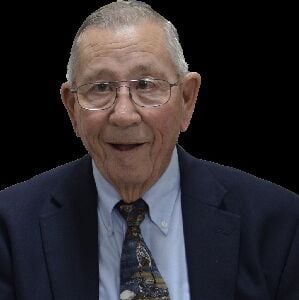They can still hear the voice that once echoed across their baseball field. It traveled well. It commanded attention.
Bob Herr, McCaskey’s legendary coach, was memorable for many reasons. His quirky antics, his attention to detail, his desire to win.
His voice.
That sound, deep and booming, never quieted in the minds of his ballplayers from the 1960s and ’70s, even as the decades slipped away.
“It was very distinctive,” Jack Neal said. “When he spoke, everyone could hear him.”
Mike McKonly emulated Herr while sharing stories of his long-ago coach. It wasn’t an impersonation. More like a tribute. Or a reflex.
Something about those days, that man’s personality and coaching style, resonates with the boys who have since aged into retirement. Herr, who died in June at age 90, never left them.
“He was a character,” McKonly said. “He did funny things that made us laugh like crazy.”
Neal thought about one anecdote in particular. One of McCaskey’s outfielders wasn’t paying close attention and kept looking over at the girls who were playing soccer nearby.
Herr walked to the mound like he was about to make a pitching change. He paused and stared toward center field.
“He waves his hand,” Neal said. “He says, ‘Whenever you’re ready to focus on this game, we’ll continue.’ ”
Losses, and there weren’t many during the best of times, were unacceptable. They required a serious response.
Milton Hershey had a tradition of giving visiting opponents chocolate bars. When McCaskey was defeated by the Spartans, the candy was no longer an acceptable gift. Herr tossed the box out of the bus.
“He says, ‘You don’t deserve this,’ ” Glenn Brooks recalled. “ ‘You didn’t play well enough.’ That was that. Those are things that you never forget.”
Brooks smiled as he recounted that moment. He spoke in Herr’s voice.
A winning tradition
Paul Robert was his full name. Many called him PR. His initials were written on his faculty mailbox at McCaskey, where he was a social studies teacher.
Herr graduated from Penn Manor and Millersville University, where he was a standout first baseman. He’s a member of the Lancaster County Sports and McCaskey Halls of Fame and is on Penn Manor’s Wall of Honor.
McCaskey was the defending Central Penn League champion when it went in search of a coach to replace Walt Kreider in 1961.
Herr landed the job and the winning never stopped. McCaskey went 14-2 that first season and was co-champs with Steel-High. He coached through the 1973 season, winning seven league titles and nearly 68% of his games.
Hal Phillips was one of the aces on Herr’s first team. The new coach made his mark immediately.
“The important thing to him was sportsmanship,” Phillips said. “You have to take the good with the bad. That helped a lot of us. Some of us were hotheads. I believe I was one of them. I hated to lose. He made me a better person. That’s for sure.”
Every detail was covered, no matter how small. McCaskey’s players watched opponents take infield practice and picked out the weak spots. They knew where a bunt should be placed.
Visits to the mound came with encouragement. Don’t worry about the opponent, Herr told his pitchers. Just hit the target.
McKonly remembers he and his teammates tucking cardboard into their sweatpants and doing sliding drills on the grass down the left-field line.
An entire session was dedicated to properly wearing a uniform. The bottom of the pants were turned inside out and the socks were pulled up. High socks were a requirement.
Even after Brooks left McCaskey, that’s how he wore his uniform.
“Bob was such a great coach,” he said. “I probably grew to appreciate him more after the fact. He taught us so much. He had a discipline about it that you just respected.”
A lifetime relationship
There are scrapbooks filled with newspaper clippings about those successful McCaskey teams. They were pieced together by Herr’s wife, Linda, and were preserved and organized by Neal.
“I look at them and say, ‘My goodness. Where do the years go?’ ” Phillips said. “It makes you think. It brings back a lot of memories. When somebody does something good for you, you just don’t forget it.”
Herr stayed connected to his players throughout their lives. Many gathered for breakfasts and lunches long after the bats and gloves were tucked away for good. They sat together and swapped old stories.
Toward the end of his life, Herr moved to Gettysburg, an enjoyable destination for a Civil War buff. When his Lancaster County home was cleared out, about 150 baseball caps were found in a closet. They were from all kinds of teams and organizations.
Those caps were used to tell Herr’s life story during his memorial service. He was a huge Red Sox fan, a Phillies scout, an army veteran and commissioner of the LNP Tournament.
To his players, he was more than a coach. He was a friend.
“He connected to us,” Neal said. “For 60 years it wasn’t uncommon to cross paths with him. He cared for his players. We could pick up on that.
“We cared for him.”
The stories will continue as long as Herr’s players are around. The coach’s voice hasn’t quieted at all. It still travels.




